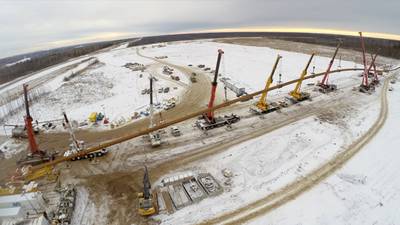U.S. President Donald Trump signed orders on Tuesday smoothing the path for the controversial Keystone XL and Dakota Access oil pipelines, rolling back key Obama administration environmental actions in favor of expanding energy infrastructure.
While oil producers in Canada and North Dakota are expected to benefit from a quicker route for
crude oil to U.S. Gulf Coast refiners, going ahead with the projects would mark a bitter defeat for Native American tribes and climate activists, who vowed to fight the decisions through legal action.
Trump campaigned on promises to increase domestic energy production and before taking office indicated he supported completion of the Dakota pipeline and reviving the C$8 billion ($6.1 billion) Keystone XL project, which was rejected in 2015 by then-President Barack Obama.
TransCanada Corp said it would resubmit an application for a permit for Keystone XL after Trump signed an order saying they could re-apply. The application will be reviewed by the U.S. State Department, which has 60 days to reach a decision.
White House Press Secretary Sean Spicer said on Tuesday it was important to "get this process back on track and get it moving," saying Keystone XL is "too important for our country."
The orders also may undo victories won by protesters in North Dakota against Energy Transfer Partners, which was denied a permit to tunnel the Dakota line under the Missouri River in December.
Protesters rallied for months against plans to route the $3.8 billion pipeline beneath a lake near the Standing Rock Sioux reservation, saying it threatened water resources and sacred Native American sites.
At one point, nearly 10,000 people had flocked to federal land in North Dakota, including a contingent of 4,000 veterans after protests turned violent at times. The primary protest camp has dwindled to several hundred after the Standing Rock tribe asked activists to leave when the U.S. Army Corps of Engineers denied the easement in December.
In a statement, the Standing Rock Sioux said they would fight the orders.
"Americans know this pipeline was unfairly rerouted towards our nation and without our consent. The existing pipeline route risks infringing on our treaty rights, contaminating our water and the water of 17 million Americans downstream," said Dave Archambault II, chairman of the Standing Rock tribe.
The North Dakota Petroleum Council, the trade group for state oil producers relying on Dakota Access to expand their crude transport options, cheered Trump's order. About 1 million barrels a day are currently produced in North Dakota.
"We think this is a great step forward for energy security in America," said Ron Ness, the council's president.
The more-than 800,000 bpd Keystone XL pipeline would bring heavy crude from Canada to the U.S. Gulf Coast. The project was conceived nearly a decade ago, but since then the U.S. shale revolution has redefined oil flows, with domestic refiners finding themselves awash with plentiful supply and needing fewer foreign imports.
Canadian Natural Resources Minister Jim Carr said in Calgary on Tuesday that Keystone XL has all the regulatory approvals it needs in Canada, and that the project would be "very positive for Canada."
Environmental activists broadly opposed the Keystone XL pipeline and campaigned against it for more than seven years, eventually winning a victory when Obama rejected the project in 2015.
Trip Van Noppen, president of nonprofit environmental law organization Earthjustice, said in a statement that Trump "appears to be ignoring the law, public sentiment and ethical considerations" with the decision.
TransCanada shares last traded up 2.9 percent on the Toronto Stock Exchange. The company did not respond to a request for comment.
'STANDING WITH THE NATIVES'
The Standing Rock tribe won a key victory when the U.S. Army Corps of Engineers in early December turned down Energy Transfer Partners' request for an easement to tunnel under the nearby Missouri River.
Most of the 1,172-mile (1,885 km) Dakota pipeline was completed by the summer of 2016, except for a small section under Lake Oahe, a reservoir that forms part of the river.
The White House memorandum said the Army and the U.S. Army Corps of Engineers should review and quickly approve permits for Dakota Access.
The Army Corps earlier this month said it would begin an environmental assessment that could delay the Dakota project further. The Standing Rock statement suggested Trump's order circumvents the environmental review.
In Cannon Ball, North Dakota, protesters, many of whom have stayed at the camp for months, expressed concern about the order but said they would continue fighting to protect the environment.
"I'm staying here. I'm standing with the natives. This is our future," said Benjamin Buffalo, 45, a Blackfeet tribal member from Browning, Montana. "I disagree with what Trump did because he's ruining the future for our children."
Trump, speaking on Tuesday in Washington, said Keystone XL would create 28,000 jobs, but that figure is at odds with a 2014 U.S. State Department environmental study, which said the project would create 3,900 U.S. construction jobs and 35 permanent jobs.
Shares of ETP, the company building the 450,000 barrel-a-day Dakota pipeline, were up 4 percent in U.S. trading.
Trump owned ETP stock through at least mid-2016, according to financial disclosure forms, and ETP's chief executive, Kelcy Warren, donated $100,000 to his campaign.
(By Steve Holland and Valerie Volcovici; Additional reporting by Terray Sylvester, Tim Gardner, Ethan Lou and Ernest Scheyder; Writing by Catherine Ngai; Editing by David Gaffen and Meredith Mazzilli)










